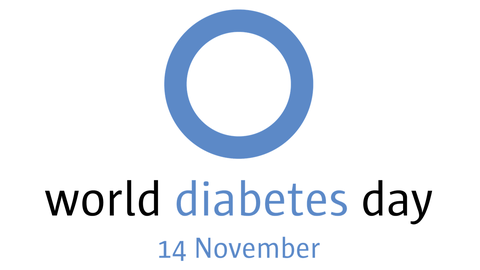Nov 12, 2024
World Diabetes Day on November 14: Focus On Education and Early Detection of Diabetes
Almost nine million people are living with type 1 diabetes worldwide. Although it can be a life-threatening condition, it often goes unnoticed and is diagnosed too late. This does not have to be the case! TU Dresden researchers invite everyone to World Diabetes Day at the Uniklinikum Dresden on November 14, 2024. They will provide information about type 1 and type 2 diabetes, and the current state of research and clinical studies.
Type 1 diabetes is a chronic condition where the body’s immune system mistakenly attacks the insulin-producing cells in the pancreas. Without insulin, a hormone that helps control blood sugar levels, the body can’t keep blood sugar levels stable and it can rise to life-threatening levels. People with type 1 diabetes need to supplement insulin every day.
Type 1 diabetes is often undiagnosed and only discovered when severe symptoms arise in childhood or early adulthood. However, it can be diagnosed early, long before symptoms arise, with nothing more than a simple blood test.
Early Detection of Type 1 Diabetes: The Fr1da-Plex-Network
After the success of the Fr1da study that started in Bavaria in 2015, researchers under the direction of Prof. Ezio Bonifacio at the Center for Regenerative Therapies Dresden (CRTD) of TU Dresden also carry out screenings in Saxony within the program “Fr1da Screening”. The program helps with an early diagnosis of type 1 diabetes and allows families and children with early-stage type 1 diabetes to take part in training and prepare themselves for life with the disease.
The Fr1da Screening program in Saxony is carried out in association with multiple German centers. Together, the programs are known as Fr1da-Plex:
- In Bavaria, Fr1da under the direction of Prof. Anette Ziegler from the Helmholtz Munich Institute for Diabetes Research.
- In Lower Saxony/Hamburg, Fr1da in the North under the direction of Prof. Olga Kordonouri of the Children's and Youth Hospital AUF DER BULT.
- In Saxony, the Fr1da program under the direction of Prof. Ezio Bonifacio at the CRTD and Prof. Reinhard Berner at the University Hospital Carl Gustav Carus Dresden.
All programs have one guiding objective: to create a consistent approach to diagnosing and caring for children with type 1 diabetes in stages 1 and 2.
“Often type 1 diabetes is discovered too late when the clinical symptoms already arise. It also leads to potentially life-threatening complications such as diabetic ketoacidosis (DKA) that increase the risk of diabetic complications and can even lead to cognitive impairment,” says Dr. Gita Gemulla, pediatric diabetologist and study physician in the clinical study group of Prof. Dr. Bonifacio at the CRTD.
The Fr1da screening programs test children between the ages of 2 and 10 for early-stage type 1 diabetes. The screening takes place in collaboration with pediatric practices and can be part of a regular medical check-up. Just a few drops of blood are enough to test a child for diabetes-specific antibodies.
“Children who test positive for at least two known autoantibodies are diagnosed with an early-stage type 1 diabetes and can take part in a special training and follow-up program that provides regular monitoring,” says Dr. Gemulla. “Through the early diagnosis, we allow the children access to new treatments, as they become available on the market. They also can participate in clinical intervention studies.”
To date, 220,392 children have been screened through Fr1da Plex, out of which 648 children were diagnosed with early-stage type 1 diabetes.
“Our study has shown that children diagnosed with presymptomatic type 1 diabetes through early screening show milder diabetes at the beginning of disease progression,” says Prof. Dr. Ziegler, head of Fr1da study in Bavaria and director of Helmholtz Munich. “We showed the efficacy of Fr1da screening through a significant reduction of the dangerous complication of ketoacidosis. In children diagnosed with early-stage type 1 diabetes, we have shown an improved clinical presentation at the onset of the metabolic disease, in comparison to children without previous screening.”
Information Stands at the Uniklinikum Dresden
The CRTD experts are available for discussions at two special information stands at the Uniklikum Dresden on World Diabetes Day on November 14, 2024. Together with colleagues from Paul Langerhans Institute Dresden (PLID), Medical Faculty, and Uniklinikum, they will provide information about type 1 and type 2 diabetes and the current state of research and clinical studies. The information stands can be found in two central areas of the University Hospital Dresden:
- in the children's hospital (Haus 21), information about type 1 diabetes for parents and young patients,
- in the staff restaurant Caruso meet&eat (Haus 22), information about type 1 and type 2 diabetes for medical staff.
For those who cannot join on-site, there is a virtual World Diabetes Day, which provides information online at www.weltdiabetestag.de.
Community Initiative by GPPAD during World Diabetes Month
Anyone who wants to take an active role in creating a world without type 1 diabetes can join a campaign by the research platform GPPAD in November –World Diabetes Month. People can collect active minutes using the Strava app from November 1 to 30, 2024. More information can be found here: https://www.strava.com/clubs/aworldwithout1.
About World Diabetes Day
World Diabetes Day is the largest global diabetes awareness campaign, reaching an audience of over 1 billion people in more than 160 countries every year. It takes place every year on November 14, the birthday of Sir Frederick Banting who, together with Charles Best, discovered insulin in 1922. The International Diabetes Federation (IDF) and the World Health Organization (WHO) established the day in 1991, and since 2006 it has been an official UN day by a resolution of the United Nations.
Media Contact:
Dr. Anja Loff (Fr1da Coordinator in Saxony)
Tel: +49 (0) 351 458 82018
E-Mail:

